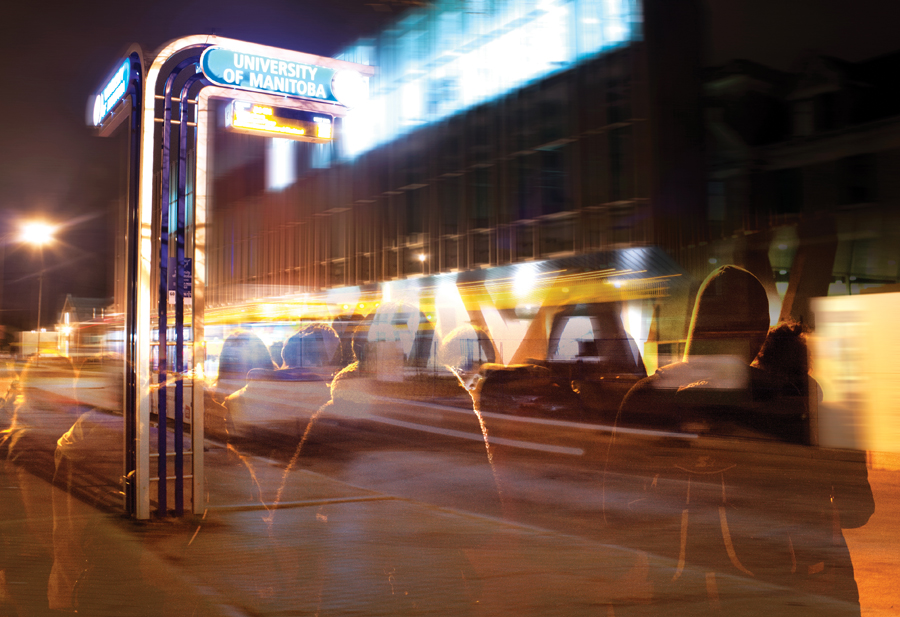Referendum results tallied Friday night at the University of Manitoba have confirmed the majority of Winnipeg students want a universal transit pass (U-Pass) program.
At a mandatory annual fee of $260 between September and April—or about $32.50 per month—the U-Pass program is meant to provide students with more affordable access to public transportation services.
According to the University of Manitoba Students’ Union (UMSU), the U-Pass would permits students “to ride Winnipeg Transit buses for the entirety of the September to April period. No fares would be charged during that time.”
Students at the University of Winnipeg and the U of M were required to show majority support for the U-Pass before city council would commit to introducing the program.
The final ballots from the UMSU referendum came in shortly after 7 p.m. Friday night. Fifty-three per cent, or 2,417 of U of M students, voted in favour of the U-Pass. In total, 4,548 (19.5 per cent) of a possible 23,277 UMSU members took part in the referendum vote.
A similar ballot count was held Wednesday following the referendum vote by University of Winnipeg Students’ Association (UWSA) members. Although the outcome ended up being the same at both schools, the winning margins were dramatically different: 1,360 students, of the roughly 10,000 total U of W student population, participated in the vote, with 1,112 (82 per cent) voting “yes” to the U-Pass.
The U-Pass program
As reported by Coun. Jenny Gerbasi, the current price tag is comparable to rates at other participating universities across Canada, like the programs offered in Vancouver ($294), Calgary ($240), Edmonton ($310), and Ottawa ($376).
In light of the successful referendum, the students’ unions, in conjunction with city council and Winnipeg Transit, have vowed to maintain the negotiated price point based on the rate of inflation and ensure that fair opt-outs are offered for students who reside outside transit service areas and for students with transportation issues.
“When city council officially approved the creation of a U-Pass—contingent on successful referenda by UMSU and the UWSA—in February of 2014, it was to begin in September 2016 or sooner if possible,” said Christian Pierce, UMSU vice-president external.
The majority vote for the U-Pass represents a binding agreement for UMSU and UWSA students. The University of Manitoba Graduate Students’ Association (GSA) held a similar vote this week to gauge the interest of graduate students’ inclusion in the program.
On Thursday, 34.2 per cent of all graduate students cast their votes. In the end, 59 per cent of that number voted in favour of the U-Pass.
With plans to communicate the results of their decision in a report to city council, the UMGSA had the highest proportional voter turnout out of all three participating parties.
“Online voting was extremely valuable to increase member participation,” said UMGSA president, Laura Rempel. “Online voting makes it very accessible, secure and easy wherever there is internet.
“We haven’t formalized our interests in participating in the universal bus pass. The results of [UMGSA’s] referendum will be the signal to city hall whether we will want to participate in the future or not.”
Pierce said all concerned parties will have to meet soon to discuss referendum results and to determine how to move forward.
“The next step will be to meet with the newly elected mayor, Brian Bowman, the director of Winnipeg Transit, the UWSA, and the UMGSA to discuss the implementation process,” said Pierce.
The shared sentiment showed by undergraduate students across the city matches up with mayor-elect Bowman’s position on the U-Pass. Bowman expressed support for the U-Pass initiative and for public transportation in general during the election, vowing to implement all six phases of rapid transit by 2030.
Students weigh in
First-year U of M student Chinelo R. Idafum said she voted in favour of the U-Pass.
“I’m an international student, and I pay a lot for tuition. It’s already too expensive, so bringing this new pass is actually in my favour because it is reducing my expenses on bus passes for the whole school year,” said Idafum. “I have a lot of friends, international and domestic, and most of them voted in favour of the pass.”
But not every student is happy with the outcome of the referendum.
“I voted ‘no’ because I drive to school, so it is a loss for me,” said engineering student Sumit Ghai. “It’s unfair because there is no option to opt-out. If there was an option to opt-out, I might have voted ‘yes,’ but I don’t want to be paying that extra fee for someone else that serves no other benefit for me.”
“Opt-outs would only be available for students living outside of Winnipeg’s city limits,” states the UMSU website. Other opt-outs may be available—such as for students with a disability—depending on further negotiations with Winnipeg Transit.
“What if I wanted someone to pay for my parking pass? No one would do that,” said Ghai.



